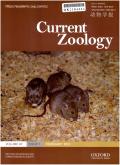Odour cues rather than personality affect tadpole deposition in a Neotropical poison frog
IF 2
2区 生物学
Q2 ZOOLOGY
引用次数: 1
Abstract
Abstract Animals constantly need to evaluate available external and internal information to make appropriate decisions. Identifying, assessing, and acting on relevant cues in contexts such as mate choice, intra-sexual competition, and parental care is particularly important for optimizing individual reproductive success. Several factors can influence decision-making, such as external environmental cues and the animal’s own internal state, yet, we have limited knowledge on how animals integrate available information. Here, we used an entire island population (57 males, 53 females, and 1,109 tadpoles) of the neotropical brilliant-thighed poison frog Allobates femoralis to investigate how 2 factors (olfactory cues and personality traits) influence the ability of males to find and use new resources for tadpole deposition. We experimentally manipulated the location of tadpole deposition sites and their associated olfactory cues, and repeatedly measured exploration and boldness in adult males. We further reconstructed tadpole deposition choices via inferred parent–offspring relationships of adult frogs and tadpoles deposited in our experimental pools using molecular parentage analysis. We found that the discovery and use of new rearing sites were heavily influenced by olfactory cues; however, we did not find an effect of the measured behavioral traits on resource discovery and use. We conclude that in highly dynamic environments such as tropical rainforests, reliable external cues likely take priority over personality traits, helping individuals to discover and make use of reproductive resources.气味线索而不是个性影响新热带毒蛙蝌蚪沉积
动物需要不断地评估可用的外部和内部信息,以做出适当的决定。在配偶选择、性内竞争和亲代抚育等环境中,识别、评估并根据相关线索采取行动,对于优化个体的生殖成功尤为重要。有几个因素可以影响决策,比如外部环境线索和动物自己的内部状态,然而,我们对动物如何整合可用信息的了解有限。在这里,我们使用整个岛屿种群(57只雄性,53只雌性和1109只蝌蚪)的新热带耀腿毒蛙Allobates femoralis来研究嗅觉线索和人格特征如何影响雄性寻找和使用蝌蚪沉积新资源的能力。我们通过实验操纵蝌蚪沉积地点的位置及其相关的嗅觉线索,并反复测量成年雄性蝌蚪的探索和大胆程度。利用分子亲代分析方法,通过推断实验池中成年青蛙和蝌蚪的亲代关系,进一步重构了蝌蚪的沉积选择。我们发现新的饲养地点的发现和使用在很大程度上受到嗅觉线索的影响;然而,我们没有发现被测量的行为特征对资源发现和使用的影响。我们的结论是,在高度动态的环境中,如热带雨林,可靠的外部线索可能优先于人格特征,帮助个体发现和利用生殖资源。
本文章由计算机程序翻译,如有差异,请以英文原文为准。
求助全文
约1分钟内获得全文
求助全文
来源期刊

Current Zoology
Agricultural and Biological Sciences-Animal Science and Zoology
CiteScore
3.20
自引率
9.10%
发文量
111
审稿时长
6 weeks
期刊介绍:
About the Journal
Current Zoology (formerly Acta Zoologica Sinica, founded in 1935) is an open access, bimonthly, peer-reviewed international journal of zoology. It publishes review articles and research papers in the fields of ecology, evolution and behaviour.
Current Zoology is sponsored by Institute of Zoology, Chinese Academy of Sciences, along with the China Zoological Society.
 求助内容:
求助内容: 应助结果提醒方式:
应助结果提醒方式:


